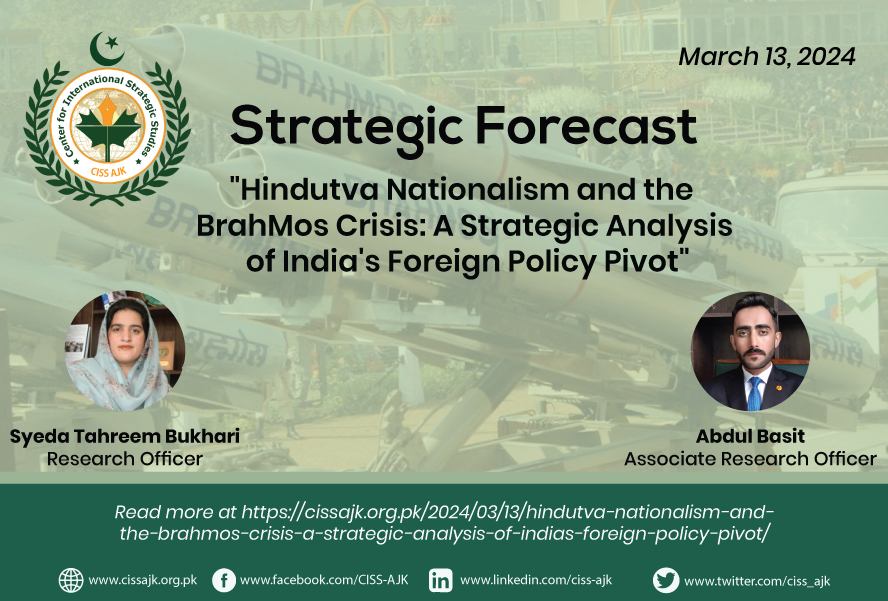Since the rise of the Modi government in New Delhi, India has undergone a profound transformation, not only in its domestic policies but also in its approach to foreign affairs. Spearheaded by influential figures such as S. Jaishankar, Ajit Doval, Rajnath Singh, and Amit Shah, India has charted a course aimed at not only reshaping its internal dynamics but also asserting its influence on the global stage. This strategic shift is underpinned by India’s aspiration to attain the status of a regional power, leveraging its economic potential to position itself as a pivotal player in international affairs. While India’s pursuit of this goal has occasionally led to deviations from established international norms, its overarching objective remains the assertion of influence both domestically and internationally. Central to India’s evolving strategic calculus is consolidating its strategic partnership with the United States. This partnership, marked by shared interests and converging worldviews, has provided India with a significant boost in its pursuit of assertive foreign policies. The deepening ties between New Delhi and Washington have emboldened India to adopt a more assertive posture, particularly towards its neighbors. This newfound confidence has manifested in India’s assertive policies, not only towards Pakistan but also towards other countries in the region.
India’s aggressive stance towards its neighbors is rooted in its historical interactions and its geopolitical aspirations. The history of Indo-Pakistani relations has been marked by a series of conflicts, including three full-scale wars, as well as ongoing tensions over the disputed region of Kashmir. Moreover, India’s interactions with smaller neighboring states have often been characterized by a hegemonic attitude, where smaller states are treated as satellites or extensions of Indian influence. This approach has further contributed to regional instability and heightened tensions. At the heart of India’s contemporary strategic posture lies the ideology of Hindutva. This nationalist ideology, which seeks to assert the dominance of Hindu culture and values, not only marginalizes religious minorities within India but also espouses the vision of “Akhand Bharat” or undivided India. While the realization of this vision may remain elusive, India’s pursuit of it has led to overt challenges to the sovereignty of its neighbors and threatens to destabilize the entire region. The promotion of Hindutva ideology by the ruling Bharatiya Janata Party (BJP) has further exacerbated tensions within India and with its neighbors.
The BrahMos incident, wherein India launched a missile into Pakistani territory on March 9, 2022, serves as a stark example of India’s aggressive behavior. The BrahMos missile, a medium-range ramjet supersonic cruise missile with nuclear capability, was jointly developed by the Indian Defence Research and Development Organisation (DRDO) and Russia’s NPO Mashinostroyeniya. Its deployment underscores India’s intent to assert its military dominance in the region and challenge the security of its neighbors.
India’s initial response to the BrahMos incident was marked by silence, which only heightened tensions in the region. Pakistan’s rightful concerns over the violation of its sovereignty by India’s actions were met with shifting explanations from New Delhi, ranging from claims of accidental launch to unauthorized actions. Such ambiguity not only underscores India’s lack of transparency but also raises questions about the safety and security of its strategic assets, particularly in light of the influence of radical elements within Indian society. Despite Pakistan’s calls for a joint probe into the incident, India conducted an internal inquiry, the findings of which were deemed unsatisfactory by Islamabad. Pakistan’s insistence on transparency and accountability reflects the gravity of the situation, as it seeks answers regarding India’s command-and-control system, safety protocols, and delayed admission of responsibility for the missile launch. Lt. Gen. (Retd.) Khalid Ahmed Kidwai’s assertion that the launch was no accident further underscores the need for a comprehensive investigation into India’s actions. Kidwai’s claim not only challenges the technical validity of India’s narrative but also highlights the underlying anxiety and apprehensions within Pakistan regarding India’s aggressive posture. The BrahMos incident, along with other instances of Indian aggression, serves as a potent reminder of the precarious nature of relations between the two nuclear-armed neighbors. India’s embrace of Hindutva ideology only exacerbates these tensions, as it fosters an environment of hostility and distrust.
The implications of India’s actions extend beyond its immediate neighbors, resonating with diaspora communities and policymakers globally. The rise of Hindutva ideology and its associated aggression raise concerns among the international community regarding regional stability and the potential for conflict escalation. As such, the need for transparent dialogue and cooperation between India and Pakistan is paramount in mitigating these risks and ensuring peace and stability in the region. India’s strategic trajectory under the Modi regime reflects a concerted effort to assert its dominance in the region, driven by a combination of economic ambition, strategic partnerships, and ideological fervor. The BrahMos incident serves as a poignant reminder of the dangers inherent in India’s aggressive posture, underscoring the imperative for transparent dialogue and accountability to prevent further escalation of tensions. Only through mutual understanding and cooperation can India and Pakistan navigate the complex geopolitical landscape of South Asia and ensure a peaceful and prosperous future for all.
Bio
Syeda Tahreem Bukhari is Research Officer at Center for International Strategic Studies, AJK
Abdul Basit is Associate Research Officer at Center for International Strategic Studies, AJK

